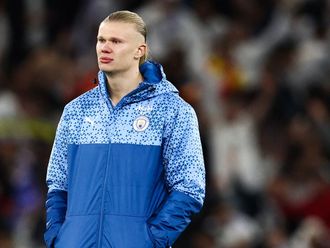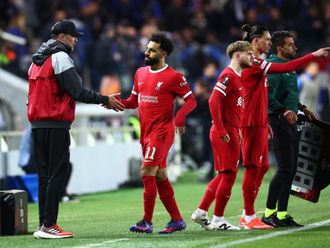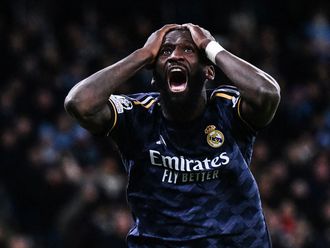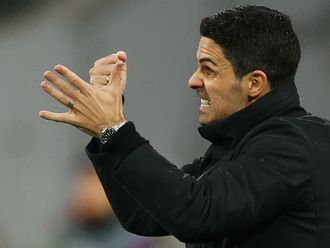London: Romelu Lukaku is 6ft 3in, weighs 15st 4lb of mostly muscle, sprints like a 100m runner and crashes through collisions like a rugby forward, yet subtle feet make him an international striker. He's 18. Anderlecht say 15 top clubs have registered interest but Chelsea are closest to signing the ‘new Didier Drogba.' Another Lukaku stat: in competitive youth football, for Anderlecht and his previous club, Lierse, this phenomenon scored 248 times in 144 games.
Already arrived in the Premier League is Souleymane Coulibaly, who signed for Tottenham last week and scored on debut for a Spurs XI. Coulibaly, with nine goals in four games at the recent Under-17 World Cup, was at Siena in Serie A and being tracked by Manchester United and Real Madrid. His label — more because he's Ivorian than for his physique — is also the ‘new Drogba.' The old Drogba is in talks over a contract extension but the most Chelsea will offer is a deal of one extra year, taking him through to 2013. Nobody is bidding for him even though, with Fernando Torres now their number one striker, his club might consider offers.
Drogba is one of the most important footballers of his generation yet there's no clamour for him. Meanwhile, Mark II Drogbas are all the rage. Why? Age. The real thing, at 33, has maybe three more seasons in him; Lukaku and Coulibaly perhaps 20. Chelsea have already paid big money for a teen — agreeing a £5m fee with Barcelona for Oriol Romeu. Transfers are a futures market nowadays.
The deals of Premier League clubs this summer have a speculative air. The most expensive signing is a 19-year-old, Phil Jones — it cost Manchester United £16.5m plus £4m add-ons to secure him from Blackburn. Three of the other top six fees so far have been for players aged 21 or younger. Almost half the £180m spent by clubs has gone on talent in this age bracket.
In contrast, numerous transfers involving older players have stalled or become sagas — Luka Modric, Samir Nasri, Charles N'Zogbia, Gary Cahill and Wesley Sneijder imagined they'd have Premier League moves by now, while Carlos Tevez and Cesc Fabregas envisaged already quitting the competition. The long list of players clubs want rid of is dominated by established performers. Call Age UK and help the likes of Craig Bellamy, Joe Cole and Robbie Keane find new homes.
Where the value lies
The older players, because of the endless ramping-up of footballers' pay, are proving too expensive to recruit. Emmanuel Adebayor — available and training with Manchester City's third string — is on £170,000 a week; Lukaku is said to earn £35,000 a week. You don't need an economics doctorate to see where the value lies. Old players, especially over-30s, have little resale value whereas even big-money youngsters can bring big profits. Every club chief executive dreams of the next Cristiano Ronaldo, who cost United what seemed a risky £12.2m aged 18, then went to Real Madrid for £80m.
United have led the way in youth-focused transfer policies. Since buying Dimitar Berbatov in 2008, Sir Alex Ferguson has paid fees for 12 players and not one was over 26. Arsene Wenger's love of youth hardly needs restating. Liverpool, since John W Henry's takeover, have gone for young targets. Newcastle, Tottenham, Wigan and Sunderland do the same.
Chelsea, with Andre Villas-Boas reshaping the squad, have joined the rush. He has signed a 19-year-old goalkeeper, Thibaut Courtois, for £7.9m, and Romeu, 19, a defensive midfielder. Under-21s don't count towards the maximum 25 players and home-grown quota that clubs's squads must include. Youngsters hold another charm. They are malleable, on and off the pitch. For Villas-Boas, bent on imposing new codes of behaviour and different tactical disciplines upon Chelsea's players, young recruits are ideal.
Intelligent teen
Chelsea first attempted to sign Lukaku at age 13 and tried again when he was 15. They mooted offering a job to his father, Roger, a former Congolese international striker, but — advised by his dad — Lukaku stayed at Anderlecht. Bright (he speaks five languages, including English and Spanish) and level-headed, he was determined to finish his education. A reality television programme, Lukaku's School, followed him as he combined classroom life in Brussels with being an Anderlecht star and Belgium international at 16. "You could see he sometimes struggled with the pressure but in the end he coped well and it was obvious he's intelligent and has good friends and family around him," says Belgian sportswriter Bart Lagae.
Anderlecht want ¤20m for Lukaku but have financial problems and might accept less. Villas-Boas says it's ‘unlikely' he'll sign a striker — recruiting wide players for his 4-3-3 system is a priority — but Chelsea's hand could be forced.
Real Madrid and Arsenal head the list of other suitors and Herman Van Holsbeeck, Anderlecht's general manager, says there's a ‘50 per cent' chance Lukaku will be sold this summer. The Belgian league commences next weekend and Anderlecht, who have a replacement lined up in Monaco's Dieumerci Mbokani, are keen for Lukaku's situation to be resolved. Anderlecht would consider raising money by selling Lukaku's economic rights to third-party investors — and a mystery consortium is rumoured to be preparing a bid.
Lukaku is a Chelsea fan and has spoken to Drogba about moving to Stamford Bridge. Other teen transfers are in the offing. Arsenal want Alex Oxlade-Chamberlain, 17, though are unwilling to meet Southampton's £12m valuation. They, along with Manchester United and Sunderland, are pursuing Joel Campbell, Costa Rica's 19-year-old striker. Another vaunted teen, Mexico's Marco Bueno, is on trial with Liverpool.
Beyond Ronaldo, there are plenty examples of gambling big money on young signings paying off: Wayne Rooney, Gareth Bale, Theo Walcott and many others. There are flops — £11.5m for Ryan Babel, anyone? — but time is on the side of talents to come good.












